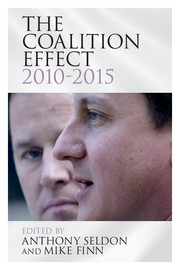Book contents
- Frontmatter
- Contents
- Contributors
- Acknowledgements
- David Cameron as Prime Minister, 2010–2015: The verdict of history
- Part I The coalition and the government of Britain
- 1 The coming of the coalition and the Coalition Agreement
- 2 The coalition and the constitution
- 3 The coalition beyond Westminster
- 4 The coalition and the executive
- 5 The coalition and Parliament
- Part II The coalition and policy
- Part III The coalition and political culture
- Part IV Conclusion
- Index
2 - The coalition and the constitution
Published online by Cambridge University Press: 05 April 2015
- Frontmatter
- Contents
- Contributors
- Acknowledgements
- David Cameron as Prime Minister, 2010–2015: The verdict of history
- Part I The coalition and the government of Britain
- 1 The coming of the coalition and the Coalition Agreement
- 2 The coalition and the constitution
- 3 The coalition beyond Westminster
- 4 The coalition and the executive
- 5 The coalition and Parliament
- Part II The coalition and policy
- Part III The coalition and political culture
- Part IV Conclusion
- Index
Summary
On 12 May 2010, after five days of negotiations following the general election, the Conservatives and Liberal Democrats concluded a Coalition Agreement for Stability and Reform. Since many conventional practices of governing, especially relating to Cabinet government and collective responsibility, have evolved in the context of single-party majority governments, the formation of a coalition government, the first in peacetime since the 1930s, might itself be viewed as a constitutional innovation. But of perhaps greater significance is the fact that the Liberal Democrats were unwilling to enter into coalition without a formal agreement being struck over certain measures of constitutional reform. For the first time in modern political history a government of the United Kingdom was founded on a binding commitment to introduce a programme of constitutional reform.
The ambition underpinning this joint undertaking should not be underestimated. That the British constitution presents itself as a flexible scheme of institutional arrangements that has evolved from habitual practice, with many aspects of this scheme being susceptible to change through the ordinary processes of legislation, is widely understood. But there is considerable distance between conservative and liberal philosophies of government. Conservatives believe that political values emerge from a tradition of civility, whereas liberals place greater faith in the power of reason; conservatives regard law, whether in the form of judicial precedent or enacted legislation, as codified social practice, whereas for liberals law specifies general standards of right conduct; conservatives believe that good government rests on an elite conscious of its responsibilities, whereas liberals, being suspicious of all power-holders, advocate the need for formal institutional limitations on the exercise of all aspects of governmental power. The Conservatives are a unionist party who believe in strong government formed on a simple majority principle reflected through the institution of a sovereign Parliament. The Liberal Democrats, by contrast, advocate a federal principle of sharing power across the various levels of government, legitimated by elections based on proportional representation.
- Type
- Chapter
- Information
- The Coalition Effect, 2010–2015 , pp. 59 - 86Publisher: Cambridge University PressPrint publication year: 2015
- 4
- Cited by



